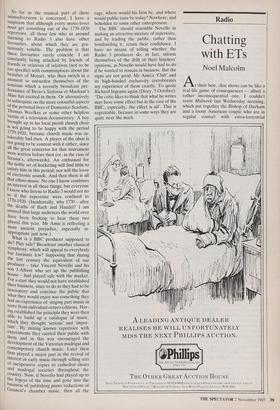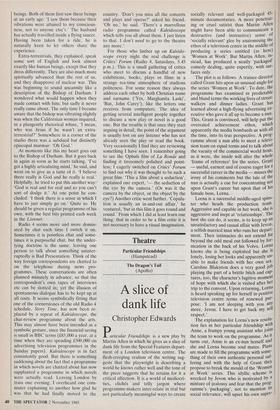Radio
Chatting with ETs
Noel Malcolm
At their best, chat shows can be like a real-life game of consequences — albeit a rather inconsequential one. I couldn't resist Midweek last Wednesday morning, which put together the Bishop of Durham and a loony American couple who are in regular contact with extra-terrestrial
beings. Both of them first saw these beings at an early age: saw them because their vibrations were attuned to my conscious- ness, not to anyone else's.' The husband has actually travelled inside a flying saucer. Having been taken for a ride, he is naturally keen to let others share the experience.
Extra-terrestrials, they explained, speak some sort of English and look almost exactly like human beings, except that they dress differently. They are also much more spiritually advanced than the rest of us, and they disapprove of nuclear war. This was beginning to sound uncannily like a description of the Bishop of Durham. I wondered what would happen when they made contact with him; but sadly it never really came about. The only time I became aware that the bishop was vibrating slightly was when the Californian woman inquired, in a plangently rhetorical whine, 'I mean, who was Jesus if he wasn't an extra- terrestrial?' Somewhere in a corner of the studio there was a subdued but distinctly episcopal murmur: 'Oh God.'
At moments like this my heart goes out to the Bishop of Durham. But it goes back in again as soon as he starts talking. 'I've got a highly articulating mind,' he said, and went on to give us a taste of it. 'I believe there really is God and he really is real.' Helpfully, he tried to put this another way:' 'God is real and for real and so you can't sort of dodge it.' At one point he con- cluded: 'I think there is a sense in which I have to just simply go on.' Quite so. He should be given a regular programme of his own, with the best bits printed each week in the Listener.
Radio 4 seems more and more domin- ated by chat each time I switch it on. Sometimes it is pointless chat and some- times it is purposeful chat, but the under- lying doctrine is the same: leaving one person to talk about something uninter- ruptedly is Bad Presentation. Think of the way foreign correspondents are chatted to on the telephone during news pro- grammes. These conversations are often planned minutely in advance, so that the correspondent's own tapes of interviews etc can be slotted in; yet the illusion of spontaneous dialogue has to be kept up at all costs. It seems symbolically fitting that one of the cornerstones of the old Radio 4 schedule „Ctory Time, has now been re- placed by a repeat of Kaleidoscope, the chat-review programme about the arts. This may almost have been intended as a symbolic gesture, since the financial saving is small in BBC terms (£85,000 a year, at a time when they are spending £500,000 on advertising television programmes in the Sunday papers). Kaleidoscope is in fact consistently good. But there is something saddening about the fact that a programme in which novels are chatted about has now supplanted a programme in which novels were actually read. Leaving London by train one evening, I overheard one com- muter explaining to another how glad he was that he had finally moved to the country. 'Don't you miss all the concerts and plays and operas?' asked his friend. 'Oh no,' he said. 'There's a marvellous radio programme called Kaleidoscope which tells you all about them. I just listen to that. I don't need to go to the theatre any more.'
For those who limber up on Kaleido- scope every night the real challenge is Critics' Forum (Radio 4, Saturdays, 5.45 p.m.). This is a small gathering of critics who meet to discuss a handful of new exhibitions, books, plays or films in a strange tea-time atmosphere of studious politeness. For some reason they always address each other by both Christian name and surname (`Yes, Marghanita Laski', `But, John Carey'), like the letters one receives from computers. The idea of getting several intelligent people together to discuss a new play or novel is a good one. But the trouble is that once they start arguing in detail, the point of the argument is usually lost on any listener who has not already seen the play or read the book. Very occasionally I find they are reviewing something I have seen. I remember going to see the Ophuls film of La Ronde and finding it tiresomely polished and point- less; I eagerly switched on Critics' Forum to find out why it was thought to be such a great film. 'This a film about a seduction',
explained one expert, the seduction of the eye by the camera.' (Or was it the camera by the object, or the object by the eye?) Another critic went further. 'Copula- tion is usually an in-and-out affair,' he ventured, 'but in this film it goes round and round.' From which I did at least learn one thing: that in order to be a film critic it is not necessary to have a visual imagination.























































 Previous page
Previous page